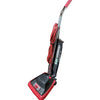
Why Charcoal Matters
One night when my teen was getting ready for bed, he came downstairs with a mouth full of toothpaste and gave me a big toothy smile. His teeth were black. I panicked for a second, instantly lamenting all the time and money we’d spent in on his mouth through the years.
It turned out he was just using charcoal toothpaste, which apparently is a thing now. Not unlike other things that become things, I had to think this one through, and it made sense. Charcoal binds to substances and removes toxins and odors. It’s logical to use charcoal in toothpaste. Similarly, it makes sense to use charcoal in a vacuum cleaner.
The Taming of the Stench
Almost as shocking as seeing black teeth is the overpowering smell of opening a closet that contains a vacuum cleaner. It’s even more pungent when you turn the vacuum on. That’s because the dirt, food crumbs and pet dander collected in the bag or dust bin accumulates, and when the vacuum is turned on and the air begins circulating, the smell emanates. Unless your vacuum is air-tight, however, there’s no way to completely contain or eliminate odors. That’s where charcoal filters come in. Charcoal removes odors and indoor volatile organic compounds (VOCs).
An Invisible Danger
VOCs are harmful organic compounds in almost everything in your home. VOCs may be found in wallpaper, paint, floor coverings, furniture, plastics, cleaners, and floor finishes. They can generate gas ozone that, unlike the one that protects the earth from radiation, is harmful. That “new carpet” smell and freshly painted room smell? Yep, they’re not good for you. If you work from home, you might be creating additional VOCs by using your essential office equipment. That’s just inside the house. When you air out your house by opening windows or circulating your HVAC fan, it’s pulling in outside air that contains contaminates, too. The goal, according to the Environmental Protection Agency, is to reduce the concentration of VOCs to improve indoor air quality and make your home healthier for crawling babies, pets, and everyone else in the home.
Material World
One way to combat odors and VOCs inside the home is to use air filtration devices that contain charcoal filters. Generally speaking, the more charcoal, the better the filtration. That’s why Riccar primarily uses two levels of charcoal filtration.
-
Charcoal filters are electrostatic filters coated in charcoal dust. They’re useful in capturing a basic level of odors and VOCs. What gets trapped in that filter is that much less to contaminate your indoor air.
-
Granulated charcoal filters contain significantly more charcoal in large granules with the largest surface area. These thick cartridges are Riccar’s best filters because there’s more material to absorb odors and gases. Granulated charcoal filters are standard in several Riccar vacuums like the R40P.6 upright and the R50TAP canister.
Location, Location, Location
In a vacuum cleaner, the charcoal filter must be near the source of the odors. It's hard to find a vacuum other than a Riccar that has a charcoal filter inside the bag compartment near the bag. This location is critical to neutralizing odors where they start.
The First Step
When searching for a vacuum, look for a vacuum with a granulated charcoal filter near the bag, not just at the exhaust air. If you already own a vacuum, ask your local dealer if there’s a granulated filter upgrade available for your machine.
Ace Vacuums wants families, including ours, to flourish in a healthy indoor environment. That’s why it partnered up with Riccar to work tirelessly to create the most effective combination of easy-to-use machines, powerful cleaning, HEPA media filtration, and in many cases, charcoal filtration. Every time you vacuum your floors using your charcoal or granulated charcoal filter, you’re taking that extra step in creating a healthier home environment. Give yourself a pat on the back – and a big, black, toothy smile.
703-997-9292
You can visit us at:
11110 Lee Highway, Fairfax, VA 22030 (in Fairfax City, VA) or
300 Fort Evans Rd, Suite 104, Leesburg, VA 20176 (Town of Leesburg, VA)
- 14 Apr, 2022



































